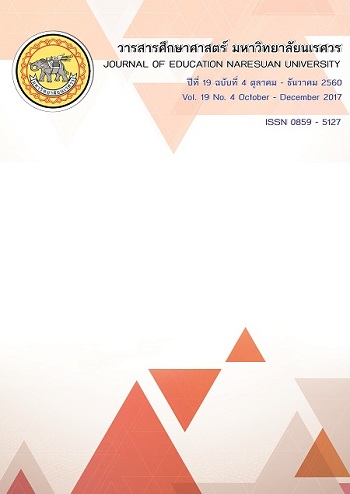THE DEVELOPMENT OF LEARNING MANAGEMENT STRATEGY BASED ON PROBLEM BASED LEARNING AND METACOGNITION TO ENHANCE SCIENTIFIC THINKING AND REFLECTIVE THINKING ABILITIES FOR PRIMARY SCHOOL STUDENTS
Main Article Content
Abstract
The purposes of this research were: 1) to develop and 2) to study the implementation of learning management strategy based on problem based learning and metacognition for primary school students. The research was divided into 3 phases. Phase 1 was to study the relevant context, the conditions and problem learning management in science at the primary school level by interviewing 5 science teachers and interviewing 5 experts in university. The data were analyzed by content analysis. Phase 2 was to the researcher synthesized the proposed strategies of learning management model and this model was verified by 5 experts. Phase 3 was to study the result of the management strategy for learning management strategy for based on problem based learning and metacognition to enhance scientific thinking and reflective thinking abilities for primary school students. The sample group consisted of 24 Prathomsuksa 3 students at Maungkonsai School under the office of Udon Thani Primary Education Service Areas 3. The instruments were an achievement test, a scientific thinking ability test, a reflective thinking ability test, a scientific thinking and reflective thinking ability observe, a scientific thinking and reflective thinking ability interview. The data were analyzed by percentage, mean, standard deviation, one sample t-test and t-test for dependent samples. The finding of this research were as follows:
1. Approach used to develop the strategy of learning management based on problem based learning and metacognition approach the results of gathering data from documents, textbooks, coherent researches, interviewing teachers and professors reveal the beneficial principle and method for holding learning activities, suitable environment and school evaluation for using these results as a guideline to draft the learning management strategy.
2. The strategy of learning management based on problem based learning and metacognition comprised 5 components: principles, objectives, content, learning procedures, and evaluation. The learning procedure of the strategies comprised 4 steps : 1) confront challenge problem, 2) united study, 3) investigate talk, 4) agree and present, The evaluation of the experts found that the strategy of learning management Mean scores was 4.85, which is appropriate in high level.
3. The effects of the developed strategy implementation revealed that:
3.1 For the students’ scientific thinking consideration, it was found that their posttest mean scores was 80.73, not less than a specified standard of 80 percent and posttest mean score higher than that of the pretest.
3.2 For the students’ reflective thinking consideration, it was found that their posttest mean scores was 82.81, not less than a specified standard of 80 percent and posttest mean score higher than that of the pretest.
Article Details
The owner of the article does not copy or violate any of its copyright. If any copyright infringement occurs or prosecution, in any case, the Editorial Board is not involved in all the rights to the owner of the article to be performed.
References
Certo, S. C., & Peter, J. P. (1991). Strategic management: Concept and Applications. New York: McGraw-Hill.
David, F. R. (1995). Strategic management. New Jersey: Prentice Hall.
Fong-in, S. (2005). A developmental study on critical reflective thinking with different child rearing and attitude toward Buddhism of junior high school schools in the educational area IV, Chaingrai province. The study of developing critical thinking of students in the third educational level (Master thesis). Bangkok: Srinakharinwirot University.
Gagne, R. M. (1988). The conditions of learning. New York: Holt, Rinehart and Winston.
Gredler, M. E. (2001). Learning instruction theory into practice (4th ed.). New Jersey: Prentice- Hill.
Mayer, D. K. (2002). Discovering emotion in classroom motivation research. Educational Psychologist, 37(2), 107-114.
Ministry of Education. (2008). The basic education core curriculum B.E. 2551 (A.D. 2008). Bangkok: The Agricultural Cooperative Federation of Thailand. (in Thai)
Pintrich, P. R., & Blumenfeld, P. C. (1985). Classroom experiences and children’a self-perception of ability effect. Journal of Education Psychology, 72, 464-657.
Saiyod, L., & Saiyod, A. (1995). Educational research technique. Bangkok: Suweeriyasarn. (in Thai)
Schunk, D. H. (2001). Learning theories: An educational perspective (3rd ed.). New York: Macmillan.
Serumola, L. B. (2003). A study of scientific thinking with young adolescents (Doctoral dissertation). Glasgow: University of Glasgow.
Susoarat, P. (20101). Thinking development (4th ed). Bangkok: Technique Printing. (in Thai)
Therdthianwong, A. (2010). The development thinking skills. Bangkok: King Mongkut's University of Technology Thonburi. (in Thai)
Yurumezoglu, K., & Oguz, A. (2007). How Close Student Teachers’ Educational Philosophies and Their Scientific Thinking Processes in Science Education.Actualite de la Recherche en Education et en Formation, Strasbourg, Turkey.

